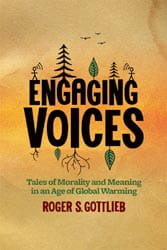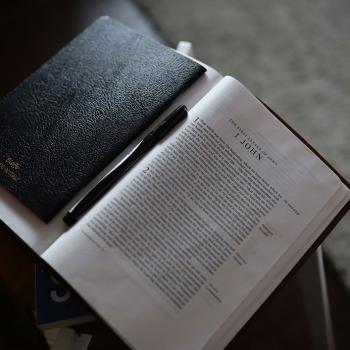 Engaging Voices: Tales of Morality and Meaning in an Age of Global Warming
Engaging Voices: Tales of Morality and Meaning in an Age of Global Warming
By Roger S. Gottlieb
Baylor University Press, 2011
240 pages
When I first glanced at this book, I expected it to be an earnest rendering of conversations on the issues of environmentalism, complete with the self-righteousness that often accompanies "isms" and ideologies on all sides of the political and activist spectrum. I poured a cup of coffee (fair trade and organic, mind you), plopped myself on the couch, and prepared to be educated and somewhat annoyed.
I was annoyed at times, but not by the author Roger Gottlieb, a philosophy professor who writes on topics in religion, ecology, and spirituality. Quite the contrary, I grew ever more impressed with Gottlieb the more annoyed I became at the characters he created in the fictional stories that make up this volume. He places his two dozen or so characters in a handful of different scenarios, each scene loosely connected (by a character, or a friend or relative of a character) to another. In one scene, a substitute teacher spends a few hours leading a discussion with prisoners. In another, an environmental activist tries to organize a local group to save a wetland. In others, a family sits down to Thanksgiving dinner, or a father and son have dinner together after a period of absence. In one of my favorites, hikers discuss environmentalism, religion, science, and politics as they seek shelter from the rain on the Appalachian Trail.
Each character brings a distinct perspective to the conversation in each scene, perspectives marked by class, race, gender, education, family background, political leanings, and more. More often than not, they hear mostly what they want to hear from the others, listen only with a view toward making their own points, strive to undermine the ideas of others in order to "win" the encounter, and view the others through the filter of stereotypes and presumption.
Hence, they can be annoying.
Gottlieb, however, presents these various scenes and encounters and draws readers with their own views, backgrounds, and perspectives into them in order to ask a most important question: How can we live with people who think very differently than us, when we can't talk to them or even listen to them? Indeed, through these meandering encounters, Gottlieb gets to what I believe is the central challenge of our era: How will we live together amidst sometimes radical differences? Differences of values, perspectives, lifestyles, and worldviews?
Gottlieb's characters engage unevenly in this question of peaceful coexistence in the midst of differences. Some come to see the ways in which they've boxed in, or written off, those who think differently from them. Some end up depressed and in despair, their anger and self-righteousness having sucked nearly all the life out of them. Still others retain their rigidity, never moving from their positional stances.
For a few, the engagements with others push them to a breaking point of sorts where they are faced with the high cost to themselves—in terms of happiness and meaning in life—of their inability to listen to others. They fail to allow that others who think differently from them might be something other than simpletons who simply haven't "thought through" everything properly, red-state capitalists who only care about money, or sloppy consumers greedily gobbling everything the advertising industry tells them they must have. Moreover, in many of these scenarios, the characters struggle to really hear each other, even when they agree on the general issue of environmentalism. Such a posture in life—"I'm right and most everyone else is wrong, please tell me where I might find my tribe"—leads to disappointment, loneliness, and despair.
The few characters who traverse this dark road to its inevitable end come to an epiphany of sorts that allows them to engage the difficult issues of the world, and the people who see things differently within them, in a new, more life-giving way. It's not a magic pill, it's not easy, and it takes practice. What Gottlieb offers, however, is a way of being in the world that is committed but not attached, rooted in one's own distinct values in a way that acknowledges the full humanity of others, even those who don't share those same values.
This is no small thing. Personally, I think the future of our world depends on some version of this new way of being. Of course, the challenge is to translate the growth the characters experience from the fictional world into the real world, from the pages of a book into the actual situations in our lives, with our family members, friends, co-workers, and neighbors. This takes enormous courage, rigorous self-examination, and a willingness to stretch in order to transcend ourselves and our current limitations. This is the real work, in my view, not only of the spiritual life, but also of our 21st-century global life in which we are interconnected in ways never before experienced in the human family.
Indeed, if we aren't feeling the stretch, we aren't doing the work.
3/22/2011 4:00:00 AM




